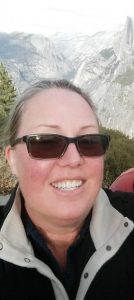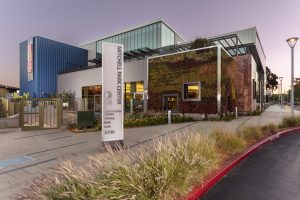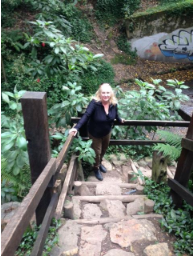Bio info will be available in the ALA Voting system in March
Coordinator-Elect
Tina Chan
What do you want to focus on during your possible tenure with the SustainRT Steering Committee?
If elected as coordinator-elect, I will further SustainRT’s goal of “a more equitable, healthy, and economically viable society” by working with SustainRT members and ALA groups to provide resources so they will be sustainability advocates and leaders, by seeking new partnerships throughout the profession and beyond, and by promoting the importance of sustainability and libraries through education and advocating the vital work we do. For example, in January 2019, ALA Council adopted diversity as one of the core values of librarianship. Adding diversity as a core value signifies to the profession the importance of diversity in libraries, and that diversity should guide our work. In this spirit, I will partner with the ALA Office for Diversity, Literacy and Outreach Services, and its member groups and affiliate organizations to build on SustainRT’s excellent work on outreach, mentorship, education, programming, and advocacy.
What is one sustainability accomplishment that you are proud of?
As a librarian at MIT Libraries, I worked with a librarian colleague to create a social justice resource guide about food and sustainability issues. We formed partnerships with campus organizations, such as Office of Sustainability, Food and Agriculture Club, and Division of Student Life, to gather information about food and sustainability issues on campus. These partnerships are integral so that the community has resources about these important subjects. The partnerships and resource guide developed demonstrate to the campus community that the library is an active partner and advocate for social justice, food, and sustainability issues.
Additionally, I incorporate sustainability practices in my personal life. For example, I bring reusable bags when I shop, my bicycle is my only form of transportation year-round, I have LED lights throughout my house, and I have an electric lawn mower and electric snow blower, among many other sustainable practices. I am proud to follow these practices that have positive environmental impacts. Living sustainably does not mean drastically changing behaviors or spending lots of money. Living sustainably means being committed, realistic, and deliberate.
What do you see as a sustainability challenge in libraries?
In January 2019, ALA Council adopted sustainability as one of the core values of librarianship. Adding sustainability as a core value signifies to the profession the importance of sustainability practices in libraries, and that sustainability should guide our work. Despite this important recognition from ALA Council, more libraries should incorporate sustainability practices in its daily work by having a sustainability plan that includes how to succeed being socially equitable, economically feasible, and environmentally sound. A sustainability plan provides a framework for systematic, relevant, and ongoing sustainability practices for all library employees, and signifies the library’s commitment to sustainability and its community. I believe unfortunately that our world will continue to have sustainability challenges, which require our immediate attention. Libraries must lead the effort to understand and address these sustainability challenges.
Is there anything else you wish to share with SustainRT members about your candidacy?
Thank you for considering voting for me as coordinator-elect! SustainRT has been a supportive and inspiring professional home to me. SustainRT has provided me many opportunities to work on sustainability issues, and to meet passionate and enthusiastic colleagues. I am grateful to give back to this extraordinary round table. I am proud to be part of a round table that encourages and supports discussions surrounding sustainability and libraries. SustainRT maintains a strong and influential role within ALA because of its committed and motivated members who advocate for sustainability and libraries, which raises awareness of SustainRT and the crucial work we do.
Mandi Goodsett
What do you want to focus on during your possible tenure with the SustainRT Steering Committee?
As SustainRT Coordinator, I would focus on the following initiatives:
- Building on the excellent work of the ALA Sustainability Task Force and the current SustainRT leadership to enact more of the Task Force recommendations. This may involve developing task forces of our own, collaborating across the association, and taking advantage of the enthusiasm and skills of our SustainRT membership.
- Increasing the membership of SustainRT by collaborating with other round tables and divisions. For example, offering joint programs or services with the New Members Round Table or the Social Responsibilities Round Table could allow us to recruit additional members.
- Exploring how SustainRT can raise awareness of climate justice as a core component of sustainability work, and as an intersection with much of the work we strive to do in ALA and librarianship more broadly. This could include offering programs or resources about this topic, and/or developing some internal round table goals for improving our own diversity, equity, and inclusion.
I would also be very open to the strategic directions and goals of the SustainRT membership, and would solicit feedback before beginning my tenure as the Round Table Coordinator.
What is one sustainability accomplishment that you are proud of?
I’m the convener of my own library’s Sustainability Interest Group, and, while it wasn’t a big and splashy initiative, I’m most proud of our interest group’s success in transitioning to using compostable dinnerware at library parties and events. Making changes in how the library conducts internal activities can sometimes be the most difficult to accomplish, and it requires education and buy-in. Once the library staff make the change, though, they know they are part of an important effort that helps everyone. In our case, while there was some initial resistance to the change, our party organizers now reach out to the library’s Sustainability Interest Group before every party to make sure we have a plan in place for composting our dinnerware. For anyone who has had similar victories, you likely know how exciting a change in attitude like this can be!
What do you see as a sustainability challenge in libraries?
One of the biggest challenges to sustainability efforts in libraries I’ve encountered is the lack of recognition on the part of stakeholders and library workers that sustainability is, in fact, very relevant to libraries. Some librarians I’ve spoken to simply don’t see why libraries should be involved in the work of making our communities more sustainable. It’s up to us to present a compelling case for why library sustainability efforts align with so many of our values as a profession: access, democracy, diversity, the public good, preservation of cultural heritage, social responsibility, and more. When we work to make our communities more sustainable, we demonstrate our desire to ensure a good quality of life for ourselves in the future, as well as for future generations who will look back on the decisions we are making now.
Is there anything else you wish to share with SustainRT members about your candidacy?
I have greatly enjoyed co-chairing the SustainRT Outreach Committee, and I have had an immensely positive experience working with other passionate SustainRT volunteers and leaders. I would cherish the opportunity to continue to work with this dedicated community in a leadership role, and I thank you very much for your consideration.
Member-at-Large Candidates
Clay Daetwyler
What is one sustainability accomplishment that you are proud of?
Helping our academic department build a sustainability-focused makerspace (now sadly in abeyance due to the pandemic).
What do you see as a sustainability challenge in libraries?
I’ve seen in a lot of settings a view that inclusion, accessibility, and sustainability are at odds with each other. We need to work to show that progress on all of these can go hand in hand instead.
What is one sustainability project or initiative spearheaded by a library that you wish you had thought of first and why?
I don’t think I have a good answer to this question. I feel that most of the time what really matters is that the work gets done, not who did it first. And a lot of the time, it seems easier to get institutional support if you can show that a program has already worked somewhere else!
Is there anything else you wish to share with SustainRT members about your candidacy?
I am new and inexperienced, but eager to work hard to move forward the work of SustainRT!
Irina Holden
What is one sustainability project or initiative or accomplishment that you are passionate about?
I am an information literacy librarian and have been teaching credit-bearing courses since 2005. First it was Information Literacy in the Sciences, and since 2014 – Information Literacy in Mathematics and Statistics. As a part of the curricula, I introduce my students to the concept of science literacy and its three major types: civic, cultural and practical. Students are required to read a couple of articles each week from the Science section of the New York Times to discuss in class or online, depending on the mode of instruction. I have followed the conversation about global warming and climate change through the lens of political climate in the U.S., and this topic has not been approved by the White House. Getting more familiar with the situation of sustainability in this country and around the world made me aware of the necessity to take action. In 2011 I developed a course, freshman seminar on science literacy and sustainability. I have been teaching it every fall. Since I’m a teaching librarian, my main mission is to educate in every way I can, and I’m trying to use every opportunity.
What do you see as a sustainability challenge in libraries?
Because of sustainability being often tied up to a word “environmental”, libraries and librarians often think about the implementation of processes and projects directly related to the environment such as switching to energy-efficient lights, encouraging double-sided printing or installing water fountains to encourage the use of refillable bottles. These are all commendable measures and they do send a message that the libraries care about the environment. However, the real challenge is to take a part in a broader conversation with other departments or organizations, depending on the library size. Being part of the community is extremely valuable if we want to spearhead our efforts in sustainability.
What is one sustainability project or initiative spearheaded by a library that you wish you had thought of first and why?
Frankly, I do not find it of crucial importance to be the one who thought of something first. I’m happy to join my colleagues in their endeavors, and often it could lead to some new initiatives or projects that I came up with myself. Sustainability is team work, and we need to encourage each other in any way we can in order to pursue it, and there are many ways to achieve it. Everyone can contribute..
Is there anything else you wish to share with SustainRT members about your candidacy?
I’d like to add that my interest in sustainability has been propelled not only by my professional pursuits, but also by my personal ones. I am an urban gardener, being a lucky user of a community garden plot in downtown Albany, in a 5-minute walk from the State Capitol. I am a member of a great food co-op, where I volunteered for nine years at the deli department and learned a lot about preparing food with local and organic ingredients. I made a lot of friends in a process, who helped me paste different bits and pieces of information together in a sustainable way and encouraged me to learn more. I always tell my students that I learn a lot from them at the end of each course. I also learn from my colleagues and friends, including SustainRT. I hope to continue to be a part of this great group, working together on new sustainable initiatives.
Kacper Jarecki
What is one sustainability project or initiative or accomplishment that you are passionate about?
Racism is a huge issue that needs to be addressed. How can we even attempt to protect Earth, when black people in the USA are still in danger just because of the color of their skin? And racism also adversely affects Asian-Americans and the Latinx community. Libraries are uniquely positioned to address disparities in our society, so we need to do our best to step up to the challenge. I am an immigrant to the USA, born in Poland. On a small level, as a kid, I was affected by bullying and the constant reminders that I was different. It was my cat who was my first friend. I love that libraries welcome everyone and can be places that bring people together. That why I work here!
As a member of the Ethnic Services Roundtable, I joined the Combating Racism taskforce, and you can watch all 6 videos from our 2020 webinar series here: https://www.nyla.org/4DCGI/cms/review.html?Action=CMS_Document&DocID=3099&MenuKey=career
What do you see as a sustainability challenge in libraries?
Libraries should be on the forefront of sustainability. Libraries were part of the sharing economy before there was a sharing economy, and libraries are still the only ones to do it for free. Besides sharing resources such as books, computers, events; libraries are also places of kindness and empathy. The biggest challenge sometimes, working in a library, is to stay positive – but by supporting each other, like we do at the Sustainability Roundtable, we can keep pushing forward, making the world a better place, starting with our local communities.
What is one sustainability project or initiative spearheaded by a library that you wish you had thought of first and why?
I am so lucky to work with wonderful colleagues in the library field – they are so smart and talented – often I wish I was half as smart as they are! I love being part of the union (shout-out to Local 1321 and the DC 37 Climate Justice committee), the New York Library Association, the American Library Association, the Public Library Association, and more – library workers are so generous with their skills and knowledge: I get to learn and benefit so much from them! Nearly everything I do, I do as part of team, so I’ve been lucky to work with great teams. Like Casey Conlin, the SustainRT president said, we are like Voltron, and combining to work together is what makes us strong!
The Hunters Point branch of Queens Public Library is hosting an online bicycling lunchtime webinar series. This is so cool! I love cycling but I still have problems changing my flat tire. This series is practical, fun, and directly deals with sustainability. It’s such a fun program. I wish I thought of it, but I’ll definitely learn from it!
Is there anything else you wish to share with SustainRT members about your candidacy?
I was running because I wanted to help out. When I first proposed having a bicycle ride from NY to Philadephia in January 2020 for ALA Midwinter, Uta and SustainRT said yes, they sponsored it and helped make it happen! Shout-out to Sarah Gluck, a fellow member, for doing all the route planning for the ride! And I’ve had a great time working with SustainRT for almost 2 years. So I’m thankful and I want to give back somehow.
Lauren Read
What is one sustainability project or initiative or accomplishment that you are passionate about?
Zero Waste excites me. I appreciate it as a two-prong approach to environmental sustainability. There are many activist, civic, and legislative groups working to eliminate waste on the systems scale, involving community composting and circular and sharing economies. The other aspect is how we conduct ourselves as consumers, making better product choices, considering the end-life of a product, but fundamentally, quashing consumerism. I like to share my experience with this lifestyle in ways that speak to accessibility and privilege. In libraryland, hosting Bea Johnson of Zero Waste Home was nixed with the pandemic, but this year I am hosting a dialogue with a local grassroots coalition on this issue.
What do you see as a sustainability challenge in libraries?
I am relieved that my profession is relatively sustainable. After all, we are built on sharing information and loaning materials rather than owning it all. I also say that providing programs for enrichment or recreation free of charge to our communities is part of the sustainable model. In short, the communal factor is commendable.
I think that the biggest challenge is change management. We discover better, more sustainable ways of doing things, and progress is often stymied by resistance to change. It’s a group effort that requires good leadership, and often it does get done but not without pushback and waste of every kind (literal and proverbial).
What is one sustainability project or initiative spearheaded by a library that you wish you had thought of first and why?
Over the past two decades, really, I have been enamoured by libraries lending unconventional things, such as artwork, musical instruments, cake pans, sewing machines and supplies, seeds, tools, and toys. I will continue to pitch the value of such lending, encouraging libraries I influence to take part for better equity of a number of things (of relevant interest to a community) that needn’t be personally owned.
Is there anything else you wish to share with SustainRT members about your candidacy?
The foundation of libraries is sustainability: equity, access, and shared resources. When culture develops in unsustainable ways, I think it a professional imperative to provide guidance, support, and inspiration to our libraries. And my involvement in a national roundtable with this commitment allows me to apply my passion with a wider reach and, hopefully, impact. Thank you for your consideration of my potential participation as a member-at-large to better participate, as part of a great group, in sustainability initiatives for the whole of ALA; subsequently, our nation’s communities; and, ultimately, our planet Earth.
Eric Tans
What is one sustainability accomplishment that you are proud of?
I am most proud of the partnerships that I have helped the MSU Library develop with other campus units related to sustainability. Through our partnership with MSU Recycling we were able to serve as a pilot location for a campus composting service and reduce our waste by improving our signage around our café. We have also partnered with the MSU Office of Sustainability to receive an ALA Resilient Communities: Libraries Respond to Climate Change grant that will support us in hosting four community events this spring on the connections of climate change, community resilience, human migration and local food and gardening. Through these partnerships and the resulting programs, we have established the library as a leader for sustainability on campus that positively influences other campus units to be more sustainable.
What do you see as a sustainability challenge in libraries?
One current challenge for libraries working toward sustainability are limited resources, particularly now that libraries are dealing with COVID pandemic impacted budgets. This could limit libraries’ abilities to develop new and innovative sustainability programming. The pandemic, however, is also a source for opportunity, as libraries have been forced to rethink policies, procedures, and programming in our whole new context. This moment represents a paradigm shift for library services and is the perfect opportunity to rethink how we can incorporate sustainability into all aspects of librarianship.
What is one sustainability project or initiative spearheaded by a library that you wish you had thought of first and why?
I am very impressed by the New York Library Association’s Sustainable Libraries Initiative, particularly their Sustainable Library Certification Program. While a certification program is not a requirement for developing a sustainable library, it does provide a path for libraries to follow without having to “re-invent the wheel”. This program not only simplifies the process of developing a comprehensive sustainability program for all types of libraries, but it also establishes a readymade cohort of libraries all working towards a similar goal for sharing ideas and strategies. NYLA should be proud of developing this program, I wish I had a been a part of that work!
Is there anything else you wish to share with SustainRT members about your candidacy?
I believe that every library is a sustainable library. A library does not need a new LEED certified building, or a green roof, or a big budget to be sustainable. Any library that provides space for community building, access to information and educational resources, and encourages the sharing and reuse of materials is already doing sustainability work. My goal if elected as Member-at-Large would be to help to highlight the value of this sustainability work already being done across libraries while also providing space to explore additional avenues for sustainability in libraries.
Sarah Tribelhorn
What is one sustainability accomplishment that you are proud of?
Although I am new to library and information science, I have a long history with sustainability and conservation efforts. I have a background in life sciences, with an MS in Ichthyology and Fisheries Science. My research experience includes understanding and enhancing the sustainability of freshwater fisheries resources for communities that rely on fishes as their primary source of protein in Southern Africa. In this research I came to fully understand sustainability as the interplay between social equity, environmental integrity, and economic feasibility. I also gained valuable experience in community-based forums and meetings, as well as inter-agency collaboration and communication.
What do you see as a sustainability challenge in libraries?
I consider one of the most challenging aspects of sustainability in libraries is a lack of the holistic understanding of sustainability and the interplay between equity, economics and the environment. In this regard, I consider sustainability literacy fundamental, starting with librarians.
What is one sustainability project or initiative spearheaded by a library that you wish you had thought of first and why?
A program that I wish I had spearheaded is including sustainability literacy in academic library curricula, such as in Sul Ross State University.
Is there anything else you wish to share with SustainRT members about your candidacy?
I am running for the SustainRT member-at-large position, and having lived and worked in Africa, Europe, and the US have a broad perspective and experience in sustainability issues and have realized the powerful role that I have as an advocate and steward. As a member of SustainRT I will endeavor to work tirelessly to promote and support the mission of this organization. I appreciate your consideration.
Richard Wade
What is one sustainability project or initiative or accomplishment that you are passionate about?
At my library, we still rely on paper a lot. I’ve been creating more Google Docs and transferring old documents to digital copies. This will eventually lead us to rely much less on paper in the future.
What do you see as a sustainability challenge in libraries?
Becoming more digitally relevant as years go by. Libraries are trying to capture the attention of patrons, all while other activities are available for them to participate in. We have to constantly monitor trends and become cognizant of how to best approach each situation.
What is one sustainability project or initiative spearheaded by a library that you wish you had thought of first and why?
McMillan Memorial Library in Wisconsin Rapids, Wisconsin installed solar panels on their roof. This saved the library a lot of money, on both maintenance and energy related costs. According to the US Green Building Council, LEED-certified buildings saved $1.2 billion in energy costs from 2015-2018. They saved an additional $715 million in maintenance costs and $54 million in waste savings. If my library instituted a policy like this, it would result in more money for programming, coupled with the ability to hire more library workers.
Is there anything else you wish to share with SustainRT members about your candidacy?
There isn’t anything else I would like to add at this time.
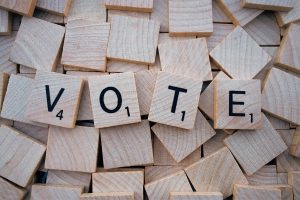
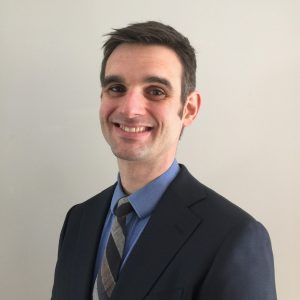
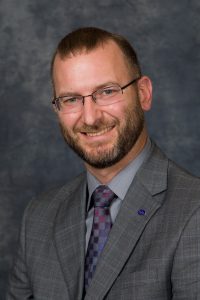
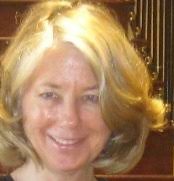
 For the past 3 years, I’ve been working with the Sustainability Initiative of the New York Library Association to define what sustainability means for libraries, and to create tools to help librarians make their organizations and their communities resilient places where people can thrive. Our work focuses on the triple bottom line of sustainability to ensure all library services and programs are socially equitable, economically feasible, and environmentally sound. As Treasurer, I hope to help connect SustainRT with our members to figure out how to bring the best resources to librarians to help them build relationships in their communities, and increase access to their services in affordable, environmentally-responsible ways.
For the past 3 years, I’ve been working with the Sustainability Initiative of the New York Library Association to define what sustainability means for libraries, and to create tools to help librarians make their organizations and their communities resilient places where people can thrive. Our work focuses on the triple bottom line of sustainability to ensure all library services and programs are socially equitable, economically feasible, and environmentally sound. As Treasurer, I hope to help connect SustainRT with our members to figure out how to bring the best resources to librarians to help them build relationships in their communities, and increase access to their services in affordable, environmentally-responsible ways. As a social sciences librarian at MIT Libraries, I specialize in the areas of energy and the environment in the social sciences. My role includes collaborating with librarian colleagues who specialize in energy and the environment in science, engineering, and urban studies and planning. By supporting MIT’s minors in energy studies and in environment & sustainability, I am able to build on the robust collections for students and faculty members.
As a social sciences librarian at MIT Libraries, I specialize in the areas of energy and the environment in the social sciences. My role includes collaborating with librarian colleagues who specialize in energy and the environment in science, engineering, and urban studies and planning. By supporting MIT’s minors in energy studies and in environment & sustainability, I am able to build on the robust collections for students and faculty members. My desire is for communities to realize their potential to conserve resources, teach them how to advocate for clean air and soil, grow useful plants, and redesign spaces to actuate all of these things. I believe that libraries are situated at a place and in a time in which we can use our collective energy to advocate for a cleaner and more efficient world, one that evolves away from reliance on fossil fuels.
My desire is for communities to realize their potential to conserve resources, teach them how to advocate for clean air and soil, grow useful plants, and redesign spaces to actuate all of these things. I believe that libraries are situated at a place and in a time in which we can use our collective energy to advocate for a cleaner and more efficient world, one that evolves away from reliance on fossil fuels. Serving on the SustainRT board as a Member-at-Large will enable me to bring 30+ years of experience as an educator, architect and library planner to comprehensive sustainability and resilience in library planning, programs, collections and facilities. Friends and I have created a Facebook page “
Serving on the SustainRT board as a Member-at-Large will enable me to bring 30+ years of experience as an educator, architect and library planner to comprehensive sustainability and resilience in library planning, programs, collections and facilities. Friends and I have created a Facebook page “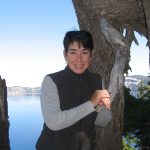 I am delighted, once again, to introduce myself as a candidate for Chair-elect of SustainRT. I grew up grounded in practices of sustainability; my siblings and I learned there was a different way to be in the world. Those early lessons stayed with me and now serve me well in my personal and work lives. Today the best lessons coming out of communities like SustainRT or my city’s Sustainability Coalition are that there is ALWAYS more to learn and that there are so many more ways to apply that knowledge than I, alone, understand. SustainRT’s mission to exchange ideas or opportunities and to present resources relevant to sustainability speaks to this beautifully.
I am delighted, once again, to introduce myself as a candidate for Chair-elect of SustainRT. I grew up grounded in practices of sustainability; my siblings and I learned there was a different way to be in the world. Those early lessons stayed with me and now serve me well in my personal and work lives. Today the best lessons coming out of communities like SustainRT or my city’s Sustainability Coalition are that there is ALWAYS more to learn and that there are so many more ways to apply that knowledge than I, alone, understand. SustainRT’s mission to exchange ideas or opportunities and to present resources relevant to sustainability speaks to this beautifully.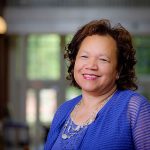 I see the role of sustainability as critical to our organization. As an information association, we are the voice to our profession. We have to be the link between what we want our libraries to model as well as the educator and training around current relevant topics. I see the Sustainability round table as the primary developer of guiding principles and the facilitator of outreach programs that encourage sustainability efforts within libraries. Your mission is to educate, inform and connect. I see your round table as the driving force for developing and sharing of values and initiating programs that can be replicated throughout any and all libraries. The task of educating is a revolving door that never closes.
I see the role of sustainability as critical to our organization. As an information association, we are the voice to our profession. We have to be the link between what we want our libraries to model as well as the educator and training around current relevant topics. I see the Sustainability round table as the primary developer of guiding principles and the facilitator of outreach programs that encourage sustainability efforts within libraries. Your mission is to educate, inform and connect. I see your round table as the driving force for developing and sharing of values and initiating programs that can be replicated throughout any and all libraries. The task of educating is a revolving door that never closes. Sustainability is relevant to the entirety of ALA. There is not one of us – member or staff – who is not touched in some way by what sustainability means. Whether we define it in terms of environmentally responsible practices, or we think of it more broadly in terms of how ALA manages and maintains its many assets, the concept should matter to us all. We see this in our libraries already. As my campaign site (
Sustainability is relevant to the entirety of ALA. There is not one of us – member or staff – who is not touched in some way by what sustainability means. Whether we define it in terms of environmentally responsible practices, or we think of it more broadly in terms of how ALA manages and maintains its many assets, the concept should matter to us all. We see this in our libraries already. As my campaign site (